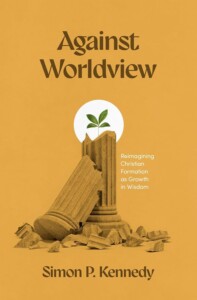
Against Worldview: Reimagining Christian Formation as Growth in Wisdom
The title is a good summary of two key objectives of this book. Kennedy is against the idea of a Christian worldview as developed largely by Reformed philosophers and theologians. Here, he joins a growing chorus of writers who have raised concerns about how the worldview approach has come to dominate evangelical Christian education. While not discarding Christian worldview education entirely, he wants to reimagine it. “My goal is to reframe Christian worldview education from a philosophical, theological, and historical standpoint” (p. 2). Kennedy goes on to propose a wisdom approach to Christian education. “Education is “the presentation of, imparting of, and pursuit of wisdom” (p. 89). I want to suggest a third way in which this book should be read. Kennedy is also providing a detailed examination of distortions of the Christian worldview concept and Christian worldview education.
The reader should perhaps be warned that this review will be rather critical, because I owe my philosophical salvation to Reformed thinkers and their concept of a Christian worldview. The evangelical Mennonite tradition within which I was raised simply couldn’t sustain me in my academic pursuits. I have found the notion of Christian worldview to be most helpful in my teaching, research, and writing. I think Kennedy’s evaluation fails to account for its strengths and mischaracterizes its weaknesses.
The Basic Argument
I begin with Kennedy’s reimagining of Christian formation and his proposal of “wisdom instead of worldview” as the proper approach to Christian education (p. 99). Chapter 4 is devoted to a careful analysis of the biblical emphasis on wisdom, particularly in Proverbs. Kennedy sees “Education as growing in wisdom,” the subtitle of this chapter. There are two types of wisdom – practical wisdom, which is “evident in the person who knows a lot about living in the cosmos that God has created,” and spiritual wisdom which “is connected to having a relationship with the Creator” (pp. 85-6).
Chapter 3 addresses the question of how we learn. Here, Kennedy draws extensively on Dutch philosopher, Herman Bavinck, and his realist account of epistemology. Education is trying to help the student to live in the real world that God has created. In this chapter, Kennedy also expands on a mosaic metaphor that he introduces in Chapter 1 and that runs throughout the book. Just as a master mosaicist starts with a plan, so God has a master plan for the education of each person. Education is “a supervised construction project, akin to the team-creation of a mosaic” (p. 64). Contrary to the Reformed model of worldview education, we don’t start with a Christian worldview and then, via “deduction,” determine what this means for each subject area. Instead, a Christian worldview is the “goal” of a person’s education, which we arrive at “inductively,” helping the student insert “wisdom tiles” piece by piece into the growing mosaic (pp. 74, 95, 99).
Why is Kennedy so opposed to the standard Reformed approach to Christian education based on the notion of a Christian worldview? And here I am limiting myself to criticisms that I believe need to be taken more seriously. A major objection is that the notion of a Christian worldview is “fuzzy,” or “so vague as to be indefensible” (pp. 1,7,12, 121). I will grant that the idea of a comprehensive worldview can be vague, but I think this criticism is unwarranted because the notion of a Christian worldview is built on the concepts of creation, fall, and redemption, which are quite specific in content.
Kennedy goes on to argue that these grand themes of the Christian worldview are “arbitrary” and “artificial” (pp. 119, 104). But every Reformed treatment of a Christian worldview that I have read provides a careful analysis of how the creation, fall, and redemption themes grow out of Scripture.
Kennedy also argues that it is foolish to think there is “one authoritative Christian worldview” (p. 16). Indeed, he prefers to talk about “a person’s worldview rather than a monolithic Christian worldview” (p.16). Here, Kennedy fails to distinguish between the notion of Christian worldview as an ideal and human understandings of a Christian worldview that are necessarily partial and therefore manifold. Remember Paul’s words, “we know in part (1 Cor 13:9). The ideal still exists, although as Kennedy correctly notes, only God has a full picture of a Christian worldview (pp. 47, 91).
In Chapter 2, Kennedy traces the history of the Christian worldview, suggesting that “the concept of Christian worldview emerged as a combat concept in contexts of perceived cultural crisis” (p. 27). Hence, an emphasis on differences with other worldviews and the need to engage in combat with them (p. 38). But times have changed, and so the traditional notion of Christian worldview “doesn’t serve the purposes of Christian education today” (p. 44).
Here, I would first of all urge caution when it comes to analyzing the motivations that led to the adoption of the concept of a Christian worldview. Surely another motivation could just as well have been to provide a faithful rendition of biblical truth. And let’s not rule out the need for intellectual combat. Jesus contested the prevailing ideas of his time, and Paul used combat imagery to describe the Christian life (Eph 6:10-18). If ever there is a time when we need to combat the ideas and ideologies of our time, it is today. Kennedy concedes this at one point and then switches to the question of how we engage in combat (p. 116).
A final and frequently made criticism by Kennedy is that it is wrong to start Christian education with a “preconceived theological paradigm” of a Christian worldview, from which we then “deduce” curricular implications (p. 104). Now, there is something right about seeing the construction of a Christian worldview as the goal of Christian education. But teachers also need a starting point. Indeed, Kennedy is forced to admit that the teacher must have some kind of a broader framework in mind when helping students put the “wisdom tiles” or “worldview tiles” into the larger mosaic (p. 96). Nor can you separate induction from deduction in teaching. Again, Kennedy is forced to admit this when he acknowledges that “teaching and instruction always start with some deductive categories” (101). Yes, indeed!
A Straw Representation of Worldview Education
So far, I have been dealing with what I have described as “serious” criticisms that Kennedy makes against the notion of a Christian worldview. I turn now to a third way in which I believe this book should be read. I believe most of the criticisms that Kennedy makes have to do with abuses or distortions of Christian worldview education. In other words, he often falls prey to the straw man fallacy. For example, he worries about “worldview tyranny” where an overarching framework and the Bible is forced onto the curriculum (p. 3). I quite agree that we shouldn’t “force Christianity and the Bible into every class” (p. 4). But good teachers who are committed to Christian worldview education avoid this. This is a distortion of Christian worldview education, not a necessary ingredient.
Kennedy worries about “dogmatic worldview thinking,” when what is needed in the classroom is “freedom to explore ideas” (pp. 1, 102). But Christian worldview education doesn’t have to be dogmatic. Indeed, Kennedy qualifies this objection by saying that this “often” happens (p. 1). But not always! And how often? Kennedy likes to contrast his wisdom approach, which is taught with “epistemic humility” with “dictating to people what belongs in the Christian worldview box and what doesn’t” (pp. 103, 104). This is loaded language. His wisdom approach doesn’t have a monopoly on epistemic humility. Healthy Christian worldview education can and should be delivered with epistemic humility, allowing students to disagree and explore other ideas. Teaching that is dogmatic and dictatorial is again a distortion of Christian worldview education, not an inevitable ingredient.
Kennedy objects to “overly simplistic notions of the connection between Christianity and worldview thinking that frame the task of education” (p. 4). He worries about using the Bible as “a proof-text machine” (4). Again, I quite agree that there are simplistic approaches to showing how the Bible relates to various disciplines, but this is again a distortion of healthy Christian worldview thinking. Reformed thinkers have themselves objected to simplistic proof-texting. Showing how the Bible is connected to a Christian worldview and to various subjects requires sophistication, and healthy Christian worldview thinking and education measures up to this requirement.
I have already looked at Kennedy’s treatment of the origins of Christian worldview thinking, which he claims has led to using worldviews as “a defensive weapon” (p. 14). “We need to replace bullets with mosaic tiles–to think about building rather than shooting” (p. 45). Note again the loaded language being used here. Note also the either-or fallacy. Surely Christian worldview thinkers want to combine constructive thinking with critiquing ideas that fall short of God’s wisdom.
And what about Kennedy’s alternative to Christian worldview education? There may be some benefit to thinking about Christian worldview education in terms of the cultivation of wisdom. But perhaps Christian wisdom education is the same as Christian worldview education. A rose by any other name is still a rose.
There is one other feature of Kennedy’s approach that deserves separate treatment. Although Kennedy at one point objects to neutrality in education, he comes dangerously close to advocating the same (p. 103). He keeps stressing that truth can be discovered outside of the Christian community (pp. 10, 56, 71, 115). He objects to sharp distinctions between “secular” and “Christian” thinking (p. 38). He talks approvingly of the “wisdom of the world” (p. 108). He quotes Wolterstorff: “The aim of Christian learning is not to be different or distinctive but to be faithful” (p. 116). For Kennedy, distinctiveness in Christian education is largely limited to catechesis and the teaching of doctrine (pp. 107, 110, 114). He argues that “the Scriptures offer limited resources for the Christian teacher (p. 105). He maintains that “[t]ruth about the world that God has made, is not confessionally determined” (p. 90).
Now I grant that there is some common ground between Christian and non-Christian thinking. Reformed thinkers like to talk about common grace. But this does not preclude knowledge and truth from being confessionally determined. There is no such thing as neutral thinking or education. There is no such thing as objective rationality. These claims are nearly universally accepted in contemporary scholarship. And Kennedy knows this. Christians should approach knowledge in all areas differently from non-Christians. It is simply false to say that Christians are only “closer to the truth” in “theology and ethics” (p. 56). “The fear of the Lord is the beginning of (all) knowledge” (Prov. 1:8).
The argument of this book is rather confusing. Although Kennedy says that he is “against worldview,” he sometimes says he doesn’t want to abandon the notion of worldview (pp. 2, 14). So, which is it? His criticisms are for the most part unwarranted and unfair. Sadly, I cannot recommend this book, though it provides a useful catalogue of distorted Christian worldview thinking and Christian worldview education.























Thank you, sir, for an excellent review.
Although I have not read this book, this is the second review of it I have read. If Professor Theissen is representing the book fairly (and I am sure he is), he criticisms are apt. I appreciate that he identified logical fallacies committed by the author. I have come across similar criticisms of worldview by other writers in the past ten years. In fact, in the second ed. of Christian Apologetics (IVP, 2022), I added a section defending the very idea of worldview and its application to apologetics in my chapter, “The Christian Worldview.” In that chapter, I lay out three different templates for addressing worldview: the propositional approach of James Sire (and others), the narrative approach of creation, fall, redemption, and the one sentence summary approach given by Ronald Nash.
Neither the Christian creed nor systematical theology is entirely captured by worldview formulations, but that does not count against worldview as concept. When done well, it is a fruitful way to organize key Christian concepts, especially for purposes of ethics, social critique, and apologetics. Thus, long live the Christian worldview! My school, Cornerstone University, is distinctively dedicated to teaching all programs and all classes from a Christian worldview and part of my role is to help faculty develop this skill for the glory of God.
The idea of a worldview has its roots in Hegel’s philosophy as the unfolding of the dialectical process of Zeitgeist, the spirit of the age, a Weltanschauung. Most cultural theory of the nineteenth century in German-speaking countries was grounded in Hegel’s philosophy of history, including the history of art. Ernst Gombrich, influenced by Karl Popper, always attacked the idea of a worldview for understanding the history of art, as it rides roughshod over significant differences found within a cultural paradigm. Wittgenstein was also critical of Hegel’s thinking, which he countered by quoting from King Lear: ” I’ll show you differences.”